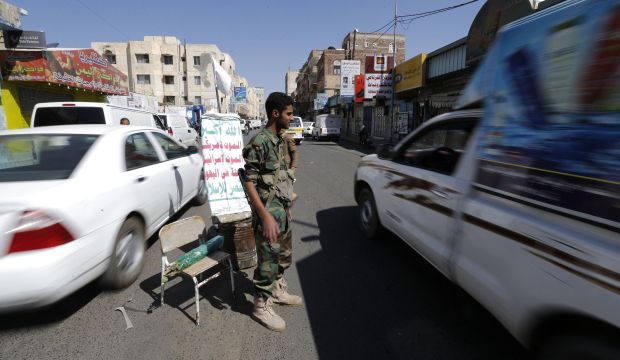
A Shi’ite Houthi militant in military uniform mans a checkpoint in Sana’a October 15, 2014. (Reuters/Khaled Abdullah)
Sana’a, Asharq Al-Awsat— The governor of Yemen’s Al-Hudaydah province, Sakhr Al-Wajih, slammed the country’s Houthi insurgents in an interview with Asharq Al-Awsat on Tuesday, accusing them of breaching their agreement with the Yemeni government and denouncing the measures they forced him to implement after seizing his office.
In comments to Asharq Al-Awsat, the governor said: “I have sent my resignation to President Abd Rabbuh Mansour Hadi in protest to the Houthi raid on my office a few days ago after forced me to implement 9 illegal and impossible demands.”
“Their demands, which including for the government to pay the expenses of thousands of their members, are difficult to respond to and contrary to the Peace and National Partnership Agreement that they signed with the government and other Yemeni political parties in September,” he added.
Wajih had previously sent a letter to parliament threatening to resign from his post unless President Abd Rabbuh Mansour Hadi personally intervened to convince the Houthis to withdraw their demands. Although Wajih—who is a former officer in the Yemeni Air Force and previously served as Minister of Finance— did approve the measures demanded by the Houthis, he says that he did so under duress after armed Houthis raided his office. He sent an official letter of resignation to the Yemeni president following his raid, although it is currently unclear if President Hadi has accepted it.
Shi’ite Houthi militia fighters continue to advance across Yemen, recently taking control of large parts of eastern Al-Hudaydah governorate, including strategic Red Sea ports. In territory under their control, the Houthis have established so-called revolutionary “popular committees” to expand their presence on the ground.
The Houthi’s demands included hiring 3,820 Houthi-affiliated fighters for regional security forces, “consulting” with the Houthis before taking any political or budgetary decisions, and granting the Houthis’ popular committees facilities to use as headquarters across the eastern governorate.
“Consenting to their demands means giving them veto power over every decision . . .And this is something that is not included in the Peace and National Partnership Agreement,” the Al-Hudaydah Governor told Asharq Al-Awsat.
“All of the items mentioned in their demands are illegal and detract from the responsibility of the central authorities,” he added.
Wajih described the atmosphere within the governorate, following the Houthi takeover, as being “intimidating,” stressing that he refuses to give the Houthis a de facto “veto” over decision-making in the province.
Hudaydah city, the provincial capital, has been under Houthi control since October 14 according to local media, with popular committees composed of members of the movement establishing checkpoints in and around the city.

Trackbacks/Pingbacks